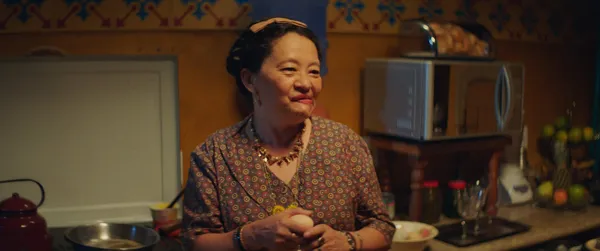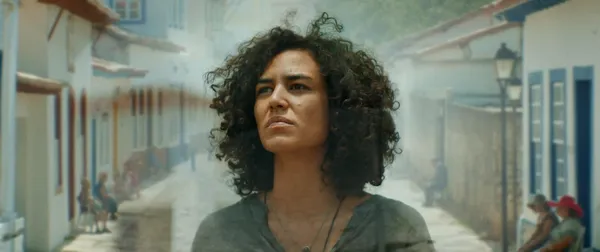 |
| Mochina (Nena Inoue) in Fogareu. Flávia Neves: 'The story of the protagonist is a little bit of my story and finding out about my past and what happened to my mother' |
The burning injustices of colonialism and Brazil's past are used to fuel Flávia Neves' debut film Fogareu (which translates as fire in English), which incorporates supernatural elements. A young woman, Fernanda (Bárbara Colen) returns to the house of her uncle Antonio Menezes (Eucir de Souza) in Goiás to find out what portion of his estate is hers following the death of her adoptive mother - now dead, but estranged from the family for years due to her homosexuality - and to scatter her ashes.
Beyond the immediate tensions that the presence of the thoroughly modern Fernanda brings to the traditionalist household, she also begins to ask questions about why the maids - mostly women with learning disabilities - who were adopted as children but are treated more like slaves than members of the family. Speaking at the UK premiere of the film at Edinburgh International Film Festival in August, Neves explained the origins of the story.
"I am from the centre of Brazil. I am from Goiás. It was the old capital of the state. And I went to uni and one of my filmmaking teachers was talking to me about this true history of people who used to adopt neurodivergent people to work in their houses and I became interested in this story. "The fact that this happened really plagued me. It shocked me and the more I thought about it, the more I wanted to make a film about it."
Neves said that as she was making preparations for the script, which she co-wrote with Melanie Dimantas, she realised the story was a lot closer to home than she had thought.
"My mom was also adopted," she said. "She was taken in as a 12-year-old to work in the mayor's house. And as a child, I really wanted to believe that my mum had been saved, and that if she wasn't adopted to work in this house, she would have been in worse off circumstances. But this truly wasn't the case. So the story of the protagonist is a little bit of my story and finding out about my past and what happened to my mother and as the film got made, the more I questioned my mum and we had conversations about the past."
The filmmaker got together an excellent cast, including Colen, who will be familiar to many non-Brazilian viewers from Bacurau and Aquarius and neurodivergent non-professionals.
 |
| Bárbara Colen as Fernanda in Fogareu |
"I really wanted to work with people from the town, where they are known - a literal translation that might feel a bit off - the "fools" or the "sillies". They have this natural inclination to perform, and I really saw an opportunity to employ this natural inclination and their personality just proved to be fantastic because it really brought this idea of collective consciousness. I really wanted to work with people who had some kind of neurodivergence - at first I thought it would be an arduous task but it was much easier than I thought. "Bárbara's was the first name that came to the table because not only is she a fantastic actress, she has a very Brazilian beauty that just embodies this character."
The director says she used the Meisner technique, which is based around actors improvising and responding to their fellow players, with the focus on those they are acting with rather than themselves.
"I got all my actors - all the neurodivergent cast and all of the non-neurodivergent cast - to start from the exact same spot with a technique that wasn't familiar to any of them, which really allowed us to build a camaraderie and vulnerability. It was a wonderful process because at the end of the day, we were all living together and building this relationship and I believe that using this practice really strengthened this bond. Neves' film is strongly anti-colonial and anti-racist, something that could be said to be at odds with the far-right regime of Jair Bolsonaro, who held power in Brazil at the time.
"The film was started in 2018 and we shot the bulk of it in 2019, which was really the beginning of this new government," says Neves. "And it was devastating what happened, and especially for filmmakers, as it affected cinema in a way that was catastrophic. We worked with this production company that had over 20 years of experience, and his government almost bankrupted them. And on top of all of that, we were shooting in the centre of the country in a region who were massive supporters of the Bolsonaro government. So it was hard to make a film that stood against the government in this specific area of the country.
"It was an odd feeling because I started writing the script in 2014 and originally this felt like a fable, it felt like something that was forever in the past and as we continued to work on the film and saw the government and this new direction that the country was taking, we will see that themes of the film started to become part of a really scary reality."
She adds: "Not only did we have to deal with this new government and this new reality, but there was also the minor issue of a global pandemic. Eventually being in the city and confirming this reality was not only a hardship in itself but it did drive us all a bit crazy."





















